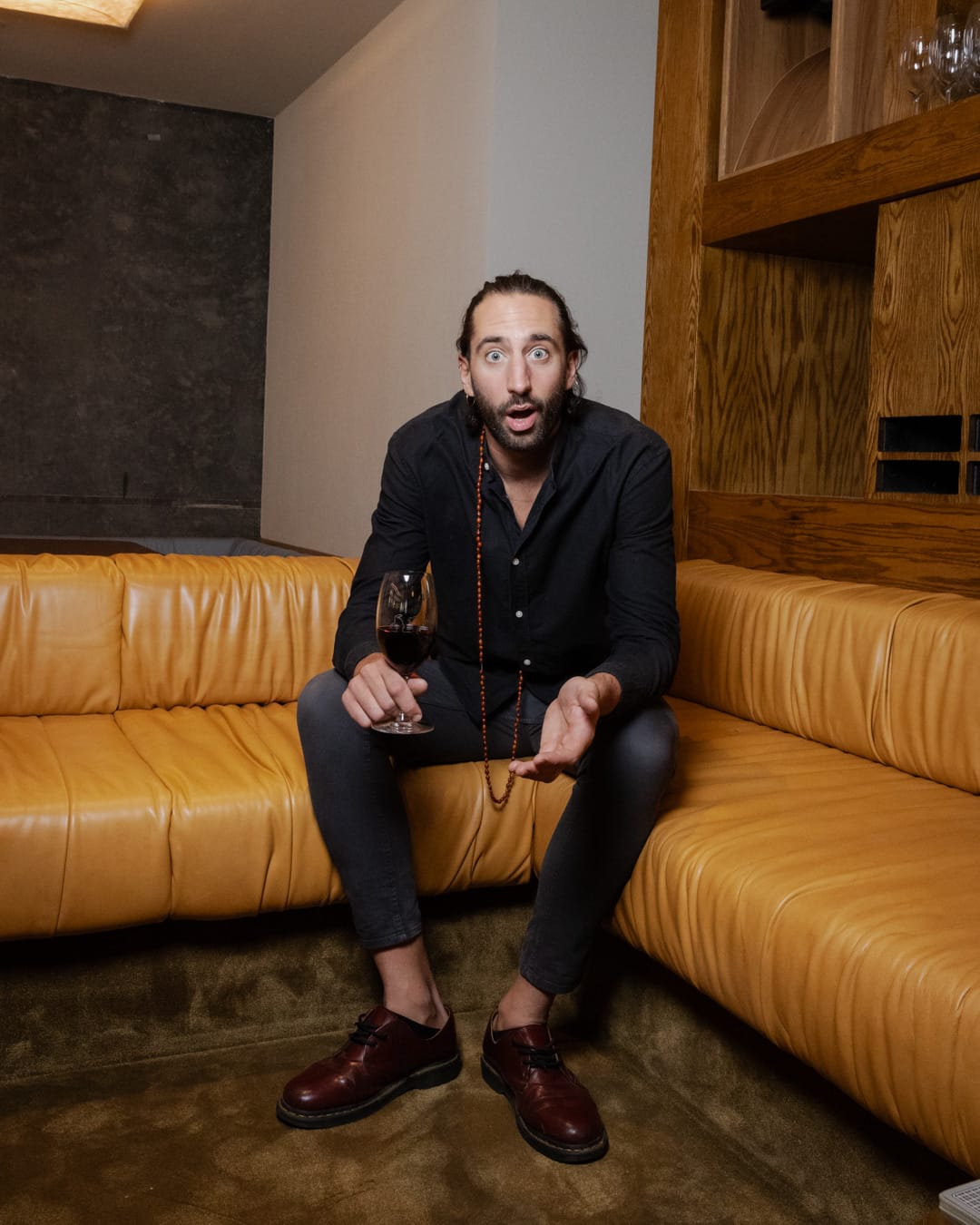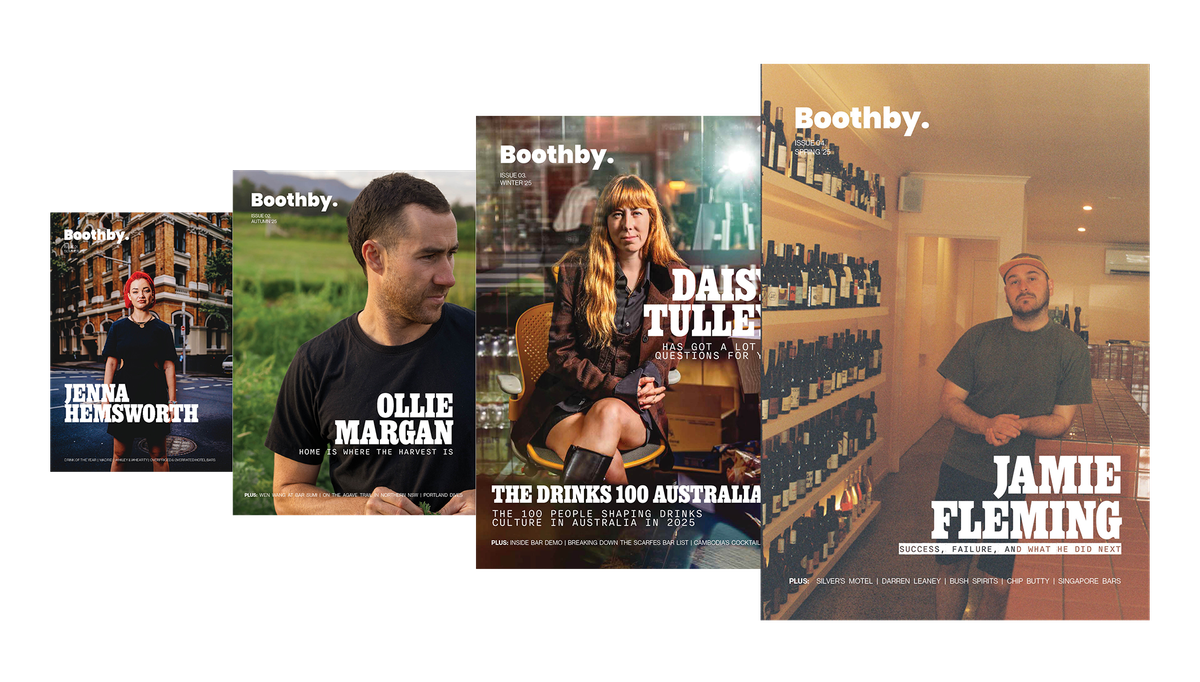What sets the very best bartenders apart from the rest?
Latteria’s co-owner and bartender Luca Baioni has a theory — and we like it.

“It all comes down to humility.”
I often ask bartenders what they think makes a great bartender. Oftentimes it’s hospitality, knowledge, passion — and that all makes sense.
But there seems to be another common thread.
There’s a moment in this week’s interview for Drinks At Work, where I’m talking to Luca Baioni about his career, and we get to talking about what sets the best bartenders apart from the rest. And we’re not talking about the very good bartenders — we’re talking about the ones who are world renowned, the all time greats.
We were talking about his time at the successful Rome bar, The Jerry Thomas Project, and how he got access to a very high calibre of bartender, travelled, and spoke about the bar in seminars at bar shows around the world.
“One thing that really stayed with me,” Luca says, “and I try to keep in my [approach] today, is the way very good bartenders — I’m not talking like bartenders like me and our friends, but the best of the world — how they are open to share things with other people, other professionals, young bartenders.”
Luca found that very best of the best were like open books when it came to knowledge sharing and mentoring — and that experience has informed the way he approaches his trade as a bartender ever since.
“I had bartenders of an international level — they’re still top 10 in the world — coming to me and showing me how to cut a garnish or how to improve my shaking or whatever,” Luca says.
“But that’s how it should be. It’s the beauty of learning so much and putting so much work in, and then be able to pass it down. Otherwise, what are you doing?”
And there might be more to it than simply doing good by the next generation.
“That tells you also that perhaps, and this is just a theory, perhaps having that approach helps you to become one of the best,” says Luca.
For this week’s episode of Drinks At Work, we’re in Adelaide, with a conversation I recorded with Luca — he’s a bartender, former brand ambassador, and now bar owner of Latteria in Adelaide, a bar and eatery that is now into its second year of trade. It’s one of my favourite spots in the city. Latteria is inspired by Luca and his business partner, Nicola’s experiences growing up in the north of Italy, and it’s a place with heart, great design, and some very good things to drink.
Below, there’s a lightly edited sample Q&A from this episode, but make sure you get the podcast to get the full chat.
Q&A with Luca Baioni, Latteria, Adelaide
BOOTHBY: How long has the bar been up and running for now?
LUCA BAIONI: Just shy of 18 months. So we opened April 24th. And then we just had our big first birthday party four months ago. And then it’s like 17, 18 months that we’re open. The place is still standing.
Hasn’t burned down yet.
Not yet. No, we have been, I think we’ve been very lucky. Our guests, they are understanding what we’re trying to do. They’ve always been very supportive since day one.
Well, that’s the best part about Adelaide. It’s on a grid, and it’s flat.
That’s what they say. And everything is 15, 20 minutes away. We are in an area where the locals, they are really living in the neighbourhood and they support the businesses around here. A lot of our clientele is, I would say, like 40 to 50 percent regulars, and they come almost every week.
So you have all walks of life here.
Yes, and I think that’s the beauty of being in this part of town and having a venue that has got the flexibility to cater for, you know, from the coffee in the afternoon, the aperitivo, the dinner, the lunch service, late night drinks, a bottle of champagne at two o’clock — a bit of everything. That’s something that we wanted from the start.
What’s the idea behind Latteria?
Latteria is inspired by those Milanese milk bars from the 70s that used to be a hybrid between grocery store, cafe, restaurant and bar. Of course, we took it to the contemporary times of nowadays, 2024, 2025, and recontextualised it in Adelaide.
A Latteria is kind of a meeting place for people?
Definitely. And that’s why it’s not in the city, in the middle of the city center. We want to be able to welcome people of all walks of life. And they can come in for a little drink, a bite to eat, stay for a tasting menu dinner, sit down and all of that. But also a night out on cocktails, which is probably what we do best.
Let’s talk about that, because I had someone tell me you have a new list?
We change it, I would say, the strong changes are twice a year. So we do the same as fashion: we do a spring, summer menu and autumn, winter.
How Milanese.
Very Milanese. You have to keep it on concept. But then we always play around with specials of the week or things on the menu that need a refresh or change, or maybe one of the staff come up with a very good idea and we make room on the menu for that. I would say the cocktails are very much for everyone. They are accessible. That’s the term that I was looking for. They’re accessible with an extra step.
One of the jobs that I had, my boss used to tell me that when you set a goal, you don’t want to set it as far as you can reach it; you want to set it a little bit further. And that’s what we try to do for our guests as well. Our cocktails, they’re very accessible. Everyone can appreciate, understand at least something on our menu. There’s something for everyone.
Which means they’re tasty, too.
They try to drive that simplicity a little bit further, not in a way that comes across as nerdy and about technique — all the technical nerdy shit that we love to do because we are bartenders, we love this stuff. [Technique is] all done back of house. All the prep happens where the eye can’t see. And then during service, it’s very seamless.
The conversation is all about hospitality, it’s all about flavour, and the atmosphere and the experience rather than being like, hey, this is how I made this drink.
You’re not shoving it down someone’s throat.
If customers want to know, our staff are there to do that, absolutely, but that’s definitely not our standard procedure for sure. But there are cocktails on the menu that take two weeks to make and multiple steps of techniques.
I think the story that comes through with the cocktail creates that extra romance that we love to showcase.
Is there a drink on the menu that sort of really kind of represents your approach at Latteria?
I’ll give you an example. You actually, I think, were able to try one of the first renditions of the Rhubarb Sbagliato. That drink is a drink that has is very much rooted in Milan, and very much contextualised in Adelaide. It’s a twist on a Negroni Sbagliato, a drink born in the 70s in Milan at Bar Basso. We use winemaking techniques to make half of the drink. It’s a fermented fruit wine with cranberry and local native currants that we ferment in almost a Beaujolais style. We do a carbonic maceration on the currants and then we add them to two different cranberry juices to then ferment them, four days maceration on currants, then we filter it, two extra days refinement.
You put in a lot of work for a fucking Sbagliato, you know? And then you put that together with Campari and our house vermouth, which is a bitter vermouth with a touch of rhubarb and bay leaf that again takes 48 hours to make.
But all of that comes out pre-batched, fully carbonated. It takes one week to make, fully carbonated, served on crystal clear ice in a beautiful glass with a simple rhubarb ribbon on top.
In front of our guests, it’s 10 seconds to make.
The latest issue of Boothby magazine is available now — to get yours visit boothby.com.au/subscribe.



